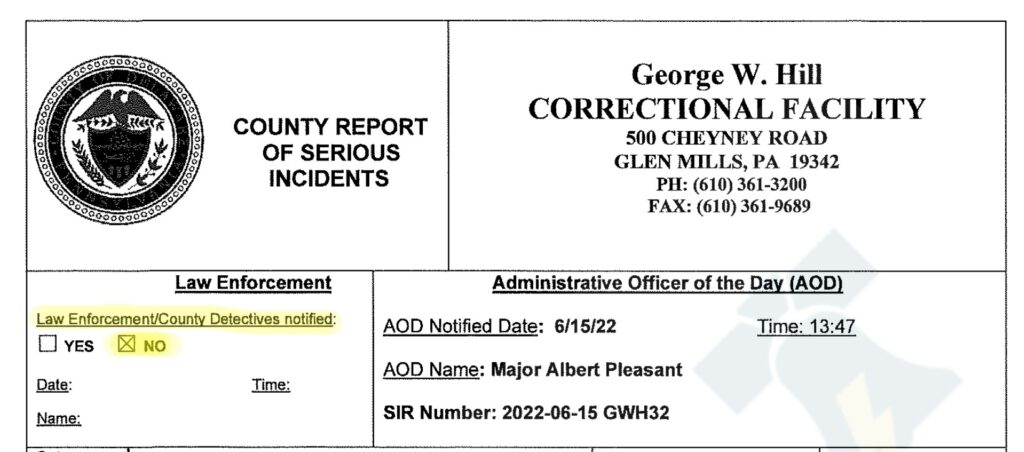Exclusive: County investigators not notified after 2022 inmate suicide at Delaware County prison
Editor’s note: The following story has explicit descriptions of suicide that may be disturbing for some readers. For anyone who is struggling with suicidal thoughts or ideations, call 988. If it is an emergency, call 911.
Officials at Delaware County’s prison did not alert criminal detectives in the wake of an inmate suicide in June 2022, according to a document obtained by Broad + Liberty.
The “County Report of Serious Incidents” document, filled out in response to the suicide of Patrick Langworthy, starts off in the upper left with a question, “Law Enforcement/County Detectives notified:” and the “No” checkbox is marked.
Failure to reach out to the district attorney’s Criminal Investigation Division (CID) after a suicide would be a major breach of protocol, according to sources with intimate knowledge of the prison’s inner workings who spoke to Broad + Liberty on a condition of anonymity for fear of career retaliation. It is currently unclear, however, whether that protocol is clearly outlined and written in a county document, or whether it’s more of an unspoken norm.
“That’s a VERY big deal,” one source told Broad + Liberty, (emphasis original). “All serious incidents such as suicide, stabbings, attempted murders, etc., should be reported to CID. The repercussions to the jail for not doing that could be extreme in my experience.”
The document was provided to Broad + Liberty by a separate source who also requested anonymity, but echoed the ideas of the first source in the belief that a failure to notify criminal investigators was a major breach.
Langworthy’s mother, Pam, reviewed the document and shared similar sentiments while also sounding a pragmatic tone.
“I would assume that no matter what kind of death happens at — especially in a prison — that they [investigators] would want to come in and look at it, whether it be natural, whether it be unnatural, just to protect the prison basically,” Langworthy said.

Emails previously obtained by Broad + Liberty through Pennsylvania’s Right to Know Law show that Warden Laura Williams was aware of the incident by at least 2:01 p.m., or about fourteen or fifteen minutes after the suicide attempt was discovered.
The “County Report of Serious Incidents” document indicates it was completed on the same day as the suicide attempt, but it does not indicate at what time it was finalized.
Delaware County District Attorney Jack Stollsteimer’s office did not acknowledge a request for comment.
The county, however, did acknowledge a request for comment, but spokeswoman Adrienne Marofsky only said, “The County does not have a comment on this.” Marofsky speaks for the five-member county council which has final authority over the prison.
Langworthy was 39 when he was admitted to the George W. Hill Correctional Facility (GWHCF) in June 2022. He was in custody for parole violations for previous drug charges.
At the time, the county had only fully taken back the management reins from a private operator for two months. In that time, the prison had already suffered an inmate-on-inmate murder, as well as another suicide that preceded Langworthy’s by eleven days.
For contrast, the incident report for Andrew Little, the man whose suicide preceded Langworthy’s, shows that CID was contacted. Little’s incident report was turned over in response to a Right to Know request, while an identically worded request for documents related to Langworthy did not yield an incident report.
In the two years since the county installed its own warden, Laura Williams, the facility has witnessed eleven deaths.
(Williams’ start date with the county was Jan. 31, 2022, as part of the transition period away from private management, according to the county. The county then assumed full control of the facility on April 6.)
The number of criminal cases originating from the prison has exploded under the government’s management, going from about a dozen or so in each of the last few years of private management, but then shooting up to 78 in 2022 and 124 in 2023. DA Stollsteimer’s office attributed some of that rise to better communication between the two entities.
But other incidents have left troubling, unanswered questions.
Mustaffa Jackson died while in prison custody for what county officials and the medical examiner called a “delayed homicide.” Jackson had been shot many years earlier and was a paraplegic as a result. The autopsy revealed that urosepsis was the underlying cause. Jackson, who had to catheterize frequently in order to simply empty his bladder, was found face down in his cell with used and new catheters strewn about.
The catheterization was quite likely the source of the urosepsis. But urosepsis can often have a lengthy onset, which raises questions about the level of care he was receiving at the time.
Tiffany Koser, who died last summer while at the intake desk of the prison was left unattended in a cell for more than an hour even though the intake officer noted Koser was under the influence of a drug. When the intake officer arrived back at the cell, Koser was already dead from an overdose.
Andrew Little’s cell door, which was supposed to be opened and closed from a control room, was inoperable just as correctional officers became aware of his suicide attempt in 2022. Sources said that the door and lock problem — something already well known in the prison — likely cost an extra two minutes for officers trying to respond to Little.
The county’s Jail Oversight Board, however, has said precious little, if anything, about these incidents and more. The Delco Coalition for Prison Reform, whose website says it “[aims] to advocate for incarcerated persons and improve conditions at George W. Hill” has likewise been largely silent.
Todd Shepherd is Broad + Liberty’s chief investigative reporter. Send him tips at tshepherd@broadandliberty.com, or use his encrypted email at shepherdreports@protonmail.com. @shepherdreports




